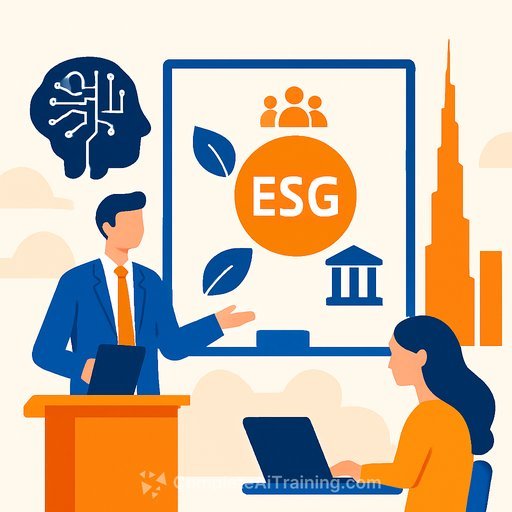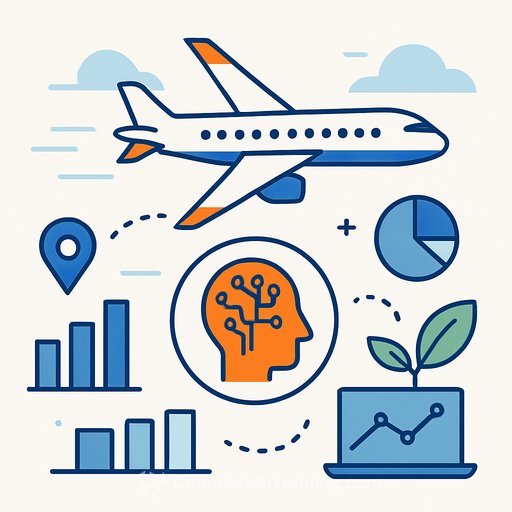FHS World 2025 Day 2, Dubai: AI, Sustainability, and Human Connection Set the Pace for Hospitality
Day 2 in Dubai was clear: technology is accelerating, but hospitality still runs on people. AI, responsible growth, and culturally rich experiences are defining how brands win bookings and loyalty.
The conversations stayed practical-how to implement AI without losing warmth, how to fund growth with discipline, and how to turn sustainability from a press release into a P&L advantage.
Day 2 at a glance: what mattered
- AI moved from concept to operations: pricing, labor planning, and guest personalization.
- Sustainability upgraded from "initiative" to "standard"-property-level action, not slogans.
- Investment thinking shifted to mixed-use ecosystems, wellness, and longer-stay value.
- Human connection remained the anchor: empathy, social skills, and recognition drive reviews and retention.
- Experiential travel-cultural depth, sports, and major events-continues to pull high-spend travelers.
Technology with a human core
AI stood out for its impact on operations and margin. Think automated check-in, dynamic pricing, accurate forecasting, and instant guest recommendations that feel personal.
The line in the sand: tech should remove friction, not the relationship. Teams need playbooks for when a person steps in-moments of surprise, recovery, and recognition.
- Standardize: use AI for rate optimization, stay extensions, and upsells; let staff deliver moments guests remember.
- Measure: track time saved per task, conversion lift per offer, and sentiment shift in reviews.
- Guardrails: keep escalation rules, audit model outputs, and train staff on AI-assisted service etiquette.
Sustainability that actually sticks
Leaders focused on carbon-positive designs, waste reduction, and local sourcing-implemented at the property level with accountability, not just corporate intent. The call for smart regulation and public-private collaboration was consistent across sessions.
Winning approach: tie sustainability to guest value and operating cost. Local menus, smarter utilities, and transparent reporting please guests and owners.
- Quick wins: linen reuse by default, F&B waste tracking, kitchen heat recovery, and smart HVAC schedules.
- Procurement: prioritize local and seasonal; standardize supplier audits.
- Reporting: publish targets and results-credibility builds brand equity and rate tolerance.
For reference, see the UNWTO guidance on sustainable tourism.
Investment moves: from rooms to ecosystems
Capital strategy is shifting from "heads in beds" to integrated value-wellness, lifestyle, branded residences, co-working, and event-led demand. Dubai's mature market and clear ownership structures continue to attract cross-border investors.
Key point: resilient returns come from long-term planning, asset flexibility, and alignment with sustainability targets.
- De-risk: diversify demand channels (events, sports, medical, cultural). Build flexible spaces.
- Unit economics: focus on length of stay, TRevPAR, and ancillary revenue per occupied room.
- Partnerships: work with city authorities and developers for infrastructure, permitting, and destination marketing.
People strategy: EQ, skills, retention
Great tech still needs great people. Teams with strong social skills, cultural fluency, and service recovery instincts win the review war.
Education partners were urged to update training to match live operations-AI literacy, guest psychology, and event logistics under real constraints.
- Hire for attitude, train for systems. Reward recognition moments that guests mention by name.
- Give frontline teams decision rights for on-the-spot recovery within clear budgets.
- Career paths: offer micro-credentials and cross-training to keep talent engaged.
Cultural and experiential travel: what guests want now
Affluent and Asian travelers are seeking meaning, not just amenities. Culturally sensitive programming, local partnerships, and event-led itineraries create memory value-and repeat business.
- Design stays around local heritage, arts, and food. Keep it respectful and accurate.
- Bundle experiences with major events and sports calendars to lift average spend.
- Use data to spot interest clusters (wellness, gastronomy, creative retreats) and build packages accordingly.
Dubai and the MEA signal
Hosting FHS World 2025 underlined Dubai's role as a testbed for scaled hospitality innovation. The wider Middle East and Africa region remains a growth corridor for investment, talent, and event-driven tourism.
Operators who move early on AI-enabled service, sustainability standards, and experience design will set rate premiums others follow.
Action checklist for GMs, owners, and event leaders
- Within 30 days: pilot AI for rate optimization and inquiry handling; set a review baseline and target lift.
- Quarter 1: implement F&B waste tracking, local supplier scorecards, and a utility reduction plan with monthly reporting.
- Talent: roll out service recovery budgets and a recognition rewards program; add AI literacy to onboarding.
- Product: build two culturally immersive packages tied to local events; measure conversion and NPS.
- Capital: model TRevPAR and length-of-stay scenarios; pressure-test ancillary revenue streams.
Want structured AI upskilling for your team?
If you're building AI capability across roles-revenue, operations, marketing-this curated library can help: AI courses by job role. It's a fast way to align training with the projects you actually need to ship.
The takeaway
AI can make service smoother and margins healthier. Sustainability can make your brand credible and your costs predictable. But the guest returns for how you made them feel.
Combine all three-smart systems, responsible operations, and real human connection-and you have a durable advantage.
Your membership also unlocks:






